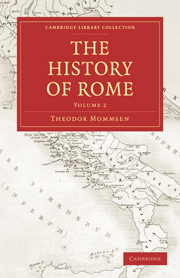Book contents
- Frontmatter
- Contents
- MAP OF ITALY
- BOOK THIRD: FROM THE UNION OF ITALY TO THE SUBJUGATION OF CARTHAGE AND OF THE GREEK STATES
- CHAPTER I CARTHAGE
- CHAPTER II THE WAR BETWEEN ROME AND CARTHAGE CONCERNING SICILY
- CHAPTER III THE EXTENSION OF ITALY TO ITS NATURAL BOUNDARIES
- CHAPTER IV HAMILCAR AND HANNIBAL
- CHAPTER V THE WAR UNDER HANNIBAL TO THE BATTLE OF CANNÆ
- CHAPTER VI THE WAR UNDER HANNIBAL FROM CANNÆ TO ZAMA
- CHAPTER VII THE WEST FROM THE PEACE OF HANNIBAL TO THE CLOSE OF THE THIRD PERIOD
- CHAPTER VIII THE EASTERN NATIONS AND THE SECOND MACEDONIAN WAR
- CHAPTER IX THE WAR WITH ANTIOCHUS OF ASIA
- CHAPTER X THE THIRD MACEDONIAN WAR
- CHAPTER XI THE GOVERNMENT AND THE GOVERNED
- CHAPTER XII THE MANAGEMENT OF LAND AND OF CAPITAL
- CHAPTER XIII FAITH AND MANNERS
- CHAPTER XIV LITERATURE AND ART
- CORRECTIONS
CHAPTER VII - THE WEST FROM THE PEACE OF HANNIBAL TO THE CLOSE OF THE THIRD PERIOD
Published online by Cambridge University Press: 05 October 2010
- Frontmatter
- Contents
- MAP OF ITALY
- BOOK THIRD: FROM THE UNION OF ITALY TO THE SUBJUGATION OF CARTHAGE AND OF THE GREEK STATES
- CHAPTER I CARTHAGE
- CHAPTER II THE WAR BETWEEN ROME AND CARTHAGE CONCERNING SICILY
- CHAPTER III THE EXTENSION OF ITALY TO ITS NATURAL BOUNDARIES
- CHAPTER IV HAMILCAR AND HANNIBAL
- CHAPTER V THE WAR UNDER HANNIBAL TO THE BATTLE OF CANNÆ
- CHAPTER VI THE WAR UNDER HANNIBAL FROM CANNÆ TO ZAMA
- CHAPTER VII THE WEST FROM THE PEACE OF HANNIBAL TO THE CLOSE OF THE THIRD PERIOD
- CHAPTER VIII THE EASTERN NATIONS AND THE SECOND MACEDONIAN WAR
- CHAPTER IX THE WAR WITH ANTIOCHUS OF ASIA
- CHAPTER X THE THIRD MACEDONIAN WAR
- CHAPTER XI THE GOVERNMENT AND THE GOVERNED
- CHAPTER XII THE MANAGEMENT OF LAND AND OF CAPITAL
- CHAPTER XIII FAITH AND MANNERS
- CHAPTER XIV LITERATURE AND ART
- CORRECTIONS
Summary
Subjugation of the valley of the Po
Celtic wars
The war waged by Hannibal had interrupted Rome in the extension of her dominion to the Alps or to the boundary of Italy, as was even now the Roman phrase, and in her organization and colonizing of the Celtic territories. It was evident that the task would now be resumed at the point where it had been broken off, and the Celts were well aware of this. In the very year of the conclusion of peace with Carthage (553) hostilities had recommenced in the territory of the Boii, who were the most immediately exposed to danger; and a first success obtained by them over the hastily assembled Roman levy, coupled with the persuasions of a Carthaginian officer, Hamilcar, who had been left behind from the expedition of Mago in northern Italy, produced in the following year (554) a general insurrection spreading beyond the two tribes immediately threatened, the Boii and Insubres. The Ligurians were driven to arms by the nearer approach of the danger, and even the youth of the Cenomani on this occasion listened less to the voice of their cautious chiefs than to the urgent appeal of their kinsmen who were in peril. Of the two fortresses constructed with a view to check the raids of the Gauls, Placentia and Cremona, the former was sacked—not more than 2000 of the inhabitants of Placentia saved their lives—and the second was invested. In haste the legions advanced to save what they could. A great battle took place before Cremona.
- Type
- Chapter
- Information
- The History of Rome , pp. 194 - 213Publisher: Cambridge University PressPrint publication year: 2010First published in: 1862



